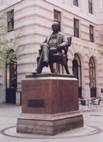
LONDON PEOPLE
George Peabody - Philanthropist 1795-1869
london-footprints.co.uk
|
LONDON PEOPLE George Peabody - Philanthropist 1795-1869 |
london-footprints.co.uk |
Any of my regular walkers will have heard the story of Peabody several times since the lasting legacy of his homes for working people can be seen all over London.
George Peabody was born in Danvers, Mass USA on 18th February 1795. He began working in a local shop when he was 11 but by the age of 19 he was in partnership with a dry goods merchant in a business which was a great success. With the intention of expanding the business he came to England in 1827 and other parts of Europe over the next 10 years. He saw the poverty and slums in which many people lived and believed the answer lay in education. In the 1850s he visited his old homes in the US and made donations to schools and libraries.
He moved to London in 1837 setting up as George Peabody & Company, Merchant and Banker. As the UK switched from an argicultural to an industrial country the populations of the towns increased dramatically. London especially expanded with the coming of the railways, which destroyed houses already in short supply. Houses were crowded, sanitation poor and disease rife with inadequate water supplies.
As Peabody thought about retiring to America he decided to make some provision for the poor of London where he had lived and worked for many years. His first ideas were for drinking fountains or schools but on the advice of Lord Shaftesbury he took up the suggestion of housing, but left the final decision to his trustees. The Peabody Donation Fund was set up in 1862 with 150,000, later increased to 500,000. At this time the 'model' housing schemes which had been in existance for some 20 years were struggling due to lack of money. The trustees decided to help the working poor but at the same time give a return of 3% so the fund would be self-perpetuating. The first estate was built in 1863 in Commercial Street, Spitalfields. It included an area for children to play, laundry facilities on the top floor and shared toilets (so that these could be monitored for disease). The accommodation at 2/6 a single room, 4/- for 2 rooms and 5/- for 3 rooms was very popular.
By 1867 Peabody had received honours from America and Britain, including being made a Freeman of the City of London, the first American to receive this honour. He died in England on 4th November 1869 at the age of 74. He was buried in Westminster Abbey but when his will was opened he had asked to be buried in his home town of Danvers, now re-named Peabody, so on 11th December his body was transported back on HMS Monarch. A bronze statue was unveiled by the Prince of Wales on 23rd July 1869 behind the Royal Exchange in the City (illustrated in header).